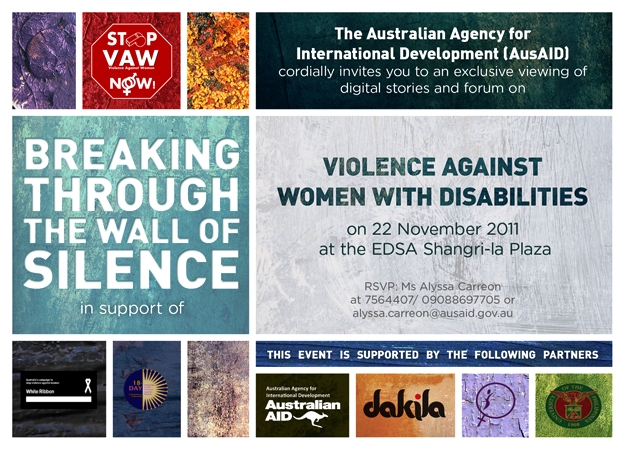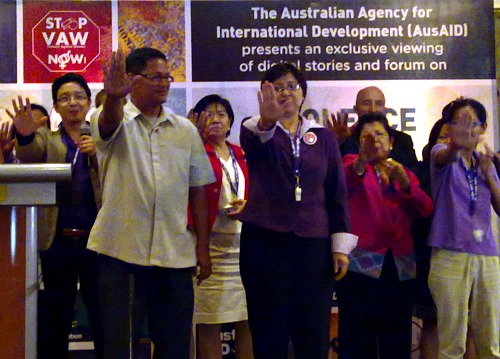Weng was not born deaf, but she lost her hearing after getting the measles when she was two years old. Abandoned by her father, she and her mother ended up living in her grandmother's house, where her uncle maltreated her. She would be treated like a house helper, and was hurt and punished whenever she didn't do what her uncle wanted. "I cannot forget the day when we were punished by squatting for long hours under the heat of the sun. My mother was looking at us, helpless and unable to fight for us. I was just crying endlessly and I thought that the day would never end," recalls Weng. Weng was able to join a deaf organization, and she strived to learn. Eventually she earned a scholarship in Japan, where she met other people with disabilities. "I saw a system were deaf people were given services by the government. I experienced great joy with my new friends," she says. Back home, although she is lucky to be working as a dental assistant to a boss who understands deaf culture, Weng shares that it is very difficult in other situations. "I have bad experiences going to court, hospitals and banks because there are no hearing service interpreters. When I filed a theft case, I was forced to pay for an interpreter service so that the court can take my case seriously. There were many instances when people laughed and made fun when I tried to communicate with them," she says.
Fast facts The 2008 National Demographic and Health Survey conducted among women aged 15-49 revealed that:
- 1 in 5 women experienced physical violence since age 15; 1 in 10 experience sexual violence.
- 14.4 percent of married women experienced physical violence perpetrated by their husband.
- Almost 4 out of 100 pregnant women experience physical violence.
Among those who experienced physical or sexual violence, 26.9 percent fought back verbally, 21.2 percent fought back physically, and 17.5 percent sought help to try to stop the violence. Of this 17.5 percent, 45.1 percent went to their own family, 28.5 percent to friends and neighbors and 14.5 percent to in-laws. The consequences of violence on women include minor to serious physical injuries, anxiety, depression, suicide attempts, and death.
Maffy also lost most of her hearing when she got measles as a baby. Her parents were supportive, putting her through speech therapy classes and providing her with a hearing aid. But they didn't want to see her as deaf, so they did not give her a chance to learn sign language. Instead, they enrolled her in a regular school. Her classmates accepted her, but she was expelled because she could not cope with the lessons, and she transferred to another school. But she was bullied in her new school. "They called me ngongo (one who speaks in a nasal tone) and imitated my speaking. They pulled my hair, threw papers at me and even destroyed my stuff. Nobody wanted to make friends with me," recalls Maffy. After her father abandoned their family, Maffy asked her mother to enroll her in a different school, like the one attended by her brother, who is a special child. At her new school, Maffy learned about sign language and the deaf culture. She became so inspired that she graduated class valedictorian. She found her own job. "I felt very good because I finally earned my own money to buy my own personal things. I felt confident and had a sense of direction in life," says Maffy. But things turned sour when her mother made her choose between staying home to take care of her brother or having a job and leaving the house. Maffy chose to leave, even though it meant she would lose her mother's support. Unable to find a job, Maffy began selling her things to be able to survive. "I believe I am normal. Deaf people are normal people. Why can't we be given opportunities? I wanted to prove that the deaf can do so many things. Even without work I tried to do good things, volunteering and even rescuing deaf survivors," said Maffy.
Not your ordinary films Maffy and Weng were able to share their stories through advocacy videos, which were shown at the “Breaking Through the Wall of Silence" forum on Violence Against Women with Disabilities. "Breaking Through the Wall of Silence" is inspired from the comunication toolkit class project of the WD 271 - Gender and Participatory Media of the U.P. Department of Women Studies in partnership with the Filipino Deaf Women Health and Crisis Center (FDWHCC) and Philippine Deaf Resource Center. "These are not your ordinary films. It's not something that can promise you aesthetic values, but this is something that we can promise is a story made by the people themselves. These are advocacy videos, made with anything practical and accessible which can be used by the grassroots community to create their own story," said Ma. Gichelle A. Cruz, Participatory Video and Digital Story Trainer-Facilitator, from the College of Social Work and Community Development, University of the Philippines.

The films were simple, photos shown one after another with subtitles and music. There were no special effects or splendid acting, but the messages were powerful. "It's not just a story of oppression or violence but a story of overcoming struggles, being able to organize, which are very important for marginalized sectors," said Cruz, who noted that unpublished studies from the Philippine Deaf Resource Center found 1 out of 3 deaf women are raped, and 75 percent are abused or battered, 63% by their fathers.) "Many people are not much aware about the deaf women. That's why we have made these videos to help the deaf women," said Maffy. Commission on Human Rights Chairperson Loretta Rosales recalled the first time she got a chance to touch base with persons with disabilities at a forum at the University of the Philippines. "They were the ones who were so vulnerable to sexual violence, and the first line of defense of women and children is to scream, but they couldn't even scream," said Rosales, who worked together with others to get some funds to help train the security forces to help PWDs. "We need this to remind us what it's all about," said Rosales. "Maybe if society has been more understanding, Weng and Maffy would not have suffered as much," said Lynette Bautista, Director of the Department of Social Welfare and Development. "Violence at most times happens right in the home, at schools, in workplaces. All of us must be able to reach out and see that we do prevent, detect and provide all the services that we can," said Bautista. In her reaction to the films, former Isabela Governor Grace Padaca said she was moved by Maffy's struggle to find a job. "It is our dream to have jobs. Maybe it is the only dream they will ever nurture in their lives. For people like us, that one single job, that one single source of income might be the highlight of our lives. We hope to spread our message to other sectors of society," she said. "If only we are given the opportunity we need not only to share our talents but first and foremost to develop them, to be treated with compassion, then we can empower ourselves not only for ourselves but for the good of our fellow PWDs and society as a whole," said Padaca. "It's time that we utilize media because media is so powerful," said Quezon City Councillor Alfred Vargas, who launched his advocacy "PWD PWeDe" last October.

Philippine Commission on Women Executive Director Emmerline Verzosa urges the audience to blow the whistle against violence on women. Carmela Lapena
Vargas said that Quezon City's goal is to make itself the most PWD-friendly city in the Philippines and in Asia. Vargas added that QC Mayor Herbert Bautista has approved the creation of the QC PWD Affairs Office. "Awareness is a very big challenge at this point. If we make everyone aware, that's already a big leap toward our goals," he said. Deputy Chief for Operations of the Philippine National Police Gen. Arturo Cacdac Jr underscored the role of men in eliminating violence against women. The PNP, composed of 88 percent men and 12 percent women, has been taking steady steps to address gender issues including violence against women," said Cacdac, adding that they are currently training officers of the Women and Children's Police Desk. In his introduction, AusAID Governance Adviser Sam Chittick emphasized the men's role in stopping violence against women. "A minority of my fellow men treat women and girls with contempt and violence, and it's up to those of us in the majority to speak out and act out to try to create a culture in which this is unacceptable," said Chittick, who encouraged the audience to join the White Ribbon campaign, an international campaign to get men to acknowledge that we are responsible for creating that culture.
Philippine Commission on Women Executive Director Emmerline Verzosa found the films very moving. "Although the film did not show physical abuse, violence against women covers emotional abuse, psychological abuse, sexual abuse and economic abuse," she explained. She ended with a quote from UN Executive Director Michelle Bachelet: "Step by step we can work together towards the day when all women live free from violence and realize their full potential as powerful agents for thriving peaceful societies." Verzosa urged the audience to join the 18-day campaign to end violence against women. Blow the Whistle on VAW is an advocacy to call on everyone to do their share in stopping violence against women. "Blowing the whistle is a symbolic gesture of commitment to putting a stop to VAW," she said. There will be a simultaneous blowing of whistles on Dec. 12, 2011 at 8 a.m.
–KG, GMA News 






